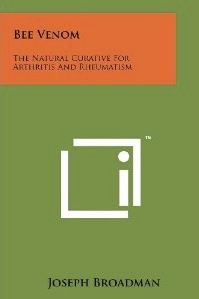BOOK REVIEW
Bee Venom
By Joseph Broadman, M.D. G.P. Putnam & Sons NY 1962
This is an valuable book for a number of reasons. First of all, when the author’s professional reputation was smeared by the AMA and the National Arthritis Foundation, he sued and won an out-of-court settlement as well as a retraction from the offending parties. This belated validation after an attempted smear campaign served to magnify the importance of the book.
In addition to his own clinical examples, Dr. Broadman reported extensively on the use of apitherapy in Europe. Born in Austria but educated at the New York University Medical School (class 1909) his fluency in German and French enabled him to compile an extensive and compelling bibliography which is appended to his work. This bibliography alone makes the book a treasure. He also quotes other doctors who have used bee venom with great numbers of patients. On page 71 a Dr. Reinwald is quoted: “In my 20 years experience at the Julius Hospital in Wuerzburg, Germany I have not come across any therapeutic agent which showed better results in the countless rheumatic cases which have come to my attention as the B preparation of “bee venom”. Page 72 offers us a similar assessment from Professor Wolfgang Weichart of Weisbaden: “In bee venom we have, as is well known, a remedy which has already been used for a long time as a lay-medicine, above all in use for rheumatic diseases. The successes achieved are confirmed by critical research workers, who have frequently tried to determine the causes for its effect”.(1953)
Dr. Broadman wrote of BVT after using it throughout a long successful career of treating rheumatological and degenerative disorders. At the time of writing, the author noted that rheumatic fever was the number one killer of children and that rheumatic diseases afflicted more people than cancer, heart disease and TB combined. His goal in writing was to make the case for bee venom as clearly and persuasively as possible for scientists and doctors and patients alike.
Today we face the same challenge to spread the word, and though the ravages of heart disease, cancer and other degenerative diseases have grown, rheumatic diseases still outpace them. Dr. Broadman’s book offers us examples of clinical trials that were state of the art when they were carried out. They were not double- blind, placebo controlled studies (today’s gold standard) but they were then and remain today compelling both in their sheer number as well as in the potential benefit they profess to impart.
The worst chauvinism in science is to forget or ignore what has been discovered in the past for in so doing, we are doomed to waste time, money andlives reinventing the therapeutic wheel. Ecclesiasticus XXXIX reminds us “The wise man will seek out the wisdom of all the ancients”. Dr. Broadman’s 1962 book based on a 60 year career is as relevant to today’s modern practitioner or scientist as any of the current medical journals. We commend it to you and your doctor!
Book review by Bradford S. Weeks, M.D. © 1989

